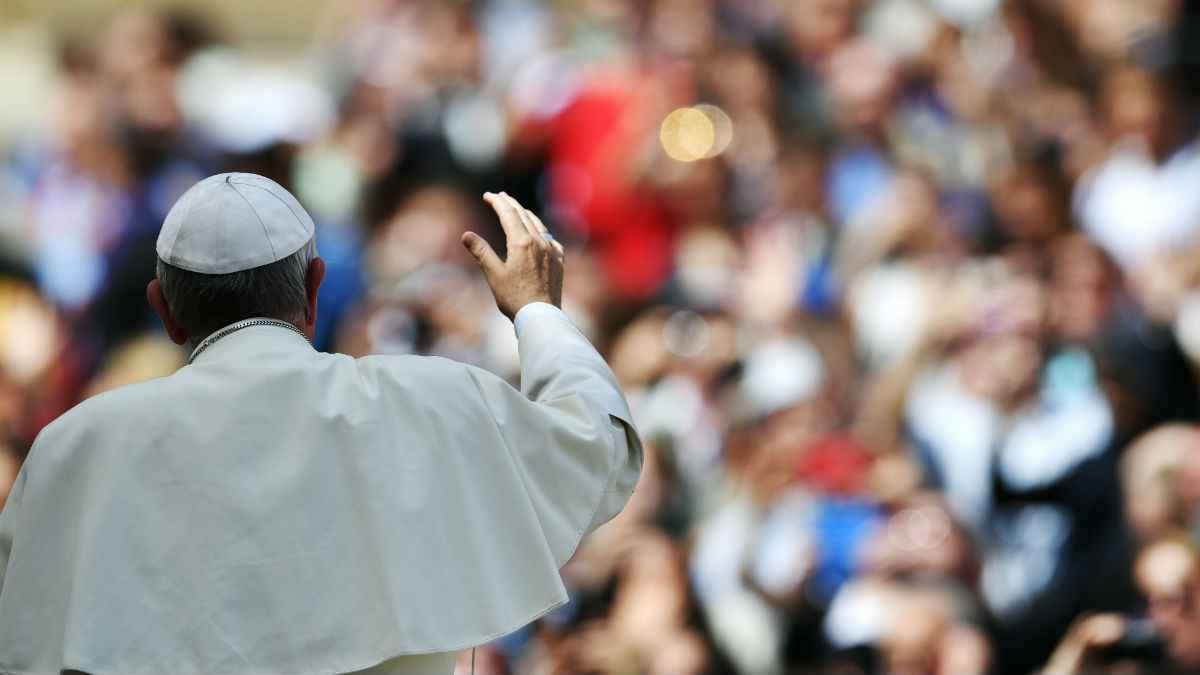What the Pope's new guidance means for Catholic families
Guidelines hailed by both conservatives and liberals – but gay believers will be disappointed

A free daily email with the biggest news stories of the day – and the best features from TheWeek.com
You are now subscribed
Your newsletter sign-up was successful
Pope Francis has published long-awaited guidelines clarifying the Catholic Church's position on family life, love and marriage.
The document, which was two years in the making, comes after hundreds of bishops from around the world held two separate synods to debate how to respond to the changing dynamics of the modern family.
Amoris Laetitia, or The Joy of Love, does not make any changes to religious doctrine, but does call for greater compassion and less judgement within the Church.
The Week
Escape your echo chamber. Get the facts behind the news, plus analysis from multiple perspectives.

Sign up for The Week's Free Newsletters
From our morning news briefing to a weekly Good News Newsletter, get the best of The Week delivered directly to your inbox.
From our morning news briefing to a weekly Good News Newsletter, get the best of The Week delivered directly to your inbox.
The 256-page document is highly nuanced and both conservatives and liberals have found cause for celebration. Acknowledging this, the Pope said: "I do not recommend a rushed reading of the text."
What it means for marriage
The Pope reaffirmed the Church's belief in traditional marriage, but also urged priests not to dismiss "the constructive elements" of non-traditional unions and to support those in "irregular situations".
The position on gay marriage remains clear and unchanged: "There are absolutely no grounds for considering homosexual unions to be in any way similar or even remotely analogous to God's plan for love and marriage," the document says.
A free daily email with the biggest news stories of the day – and the best features from TheWeek.com
However, LGBT groups will welcome comments that "every person, regardless of sexual orientation, ought to be respected in his or her dignity and treated with consideration", reports The Guardian.
For divorced Catholics
Many progressives hoped the Pope might loosen the ban preventing those who have divorced and remarried from taking communion.
While he did not explicitly grant blanket access, the Pontiff said divorced Catholics should be welcomed into Church life, suggesting it could be determined on a case-by-case basis, says the Washington Post.
Reproduction
Francis reaffirmed the Vatican's hardline opposition to abortion, saying: "No alleged right to one's own body can justify a decision to terminate that life." No compromise was made with regards to fertility treatment neither, with the birth of a child being seen as a gift from God.
What has the reaction been?
There is "some disappointment" among progressives, Christian Weisner, a founding member of the Munich-based Catholic reform group, We Are Church, told the Washington Post.
"But what I see here is that he is starting a process, one that will redefine the moral teachings of the Roman Catholic Church."
Caroline Wyatt, the BBC's religion correspondent, said the Pontiff was forced to tread a careful path to please bishops from around the world.
"Traditionalists are likely to say that Pope Francis is opening the door to chaos in the future by suggesting that a 'one size fits all' Church is not the way forward," she argues.
"Likewise, some liberals will be bitterly disappointed that there is not a greater welcome for gay Catholics – something Pope Francis was never likely to deliver."
But Thomas Groome, a theology professor at Boston College and a former priest, said the document offered more than many were expecting.
"It's a heck of an improvement from where we were with John Paul and Benedict, when we couldn't even discuss these issues. At least he's lifted the embargo on discussing them."
-
 Quiz of The Week: 14 – 20 February
Quiz of The Week: 14 – 20 FebruaryQuiz Have you been paying attention to The Week’s news?
-
 The Week Unwrapped: Do the Freemasons have too much sway in the police force?
The Week Unwrapped: Do the Freemasons have too much sway in the police force?Podcast Plus, what does the growing popularity of prediction markets mean for the future? And why are UK film and TV workers struggling?
-
 Properties of the week: pretty thatched cottages
Properties of the week: pretty thatched cottagesThe Week Recommends Featuring homes in West Sussex, Dorset and Suffolk
-
 Epstein files topple law CEO, roil UK government
Epstein files topple law CEO, roil UK governmentSpeed Read Peter Mandelson, Britain’s former ambassador to the US, is caught up in the scandal
-
 Iran and US prepare to meet after skirmishes
Iran and US prepare to meet after skirmishesSpeed Read The incident comes amid heightened tensions in the Middle East
-
 Israel retrieves final hostage’s body from Gaza
Israel retrieves final hostage’s body from GazaSpeed Read The 24-year-old police officer was killed during the initial Hamas attack
-
 China’s Xi targets top general in growing purge
China’s Xi targets top general in growing purgeSpeed Read Zhang Youxia is being investigated over ‘grave violations’ of the law
-
 Panama and Canada are negotiating over a crucial copper mine
Panama and Canada are negotiating over a crucial copper mineIn the Spotlight Panama is set to make a final decision on the mine this summer
-
 Why Greenland’s natural resources are nearly impossible to mine
Why Greenland’s natural resources are nearly impossible to mineThe Explainer The country’s natural landscape makes the task extremely difficult
-
 Iran cuts internet as protests escalate
Iran cuts internet as protests escalateSpeed Reada Government buildings across the country have been set on fire
-
 US nabs ‘shadow’ tanker claimed by Russia
US nabs ‘shadow’ tanker claimed by RussiaSpeed Read The ship was one of two vessels seized by the US military